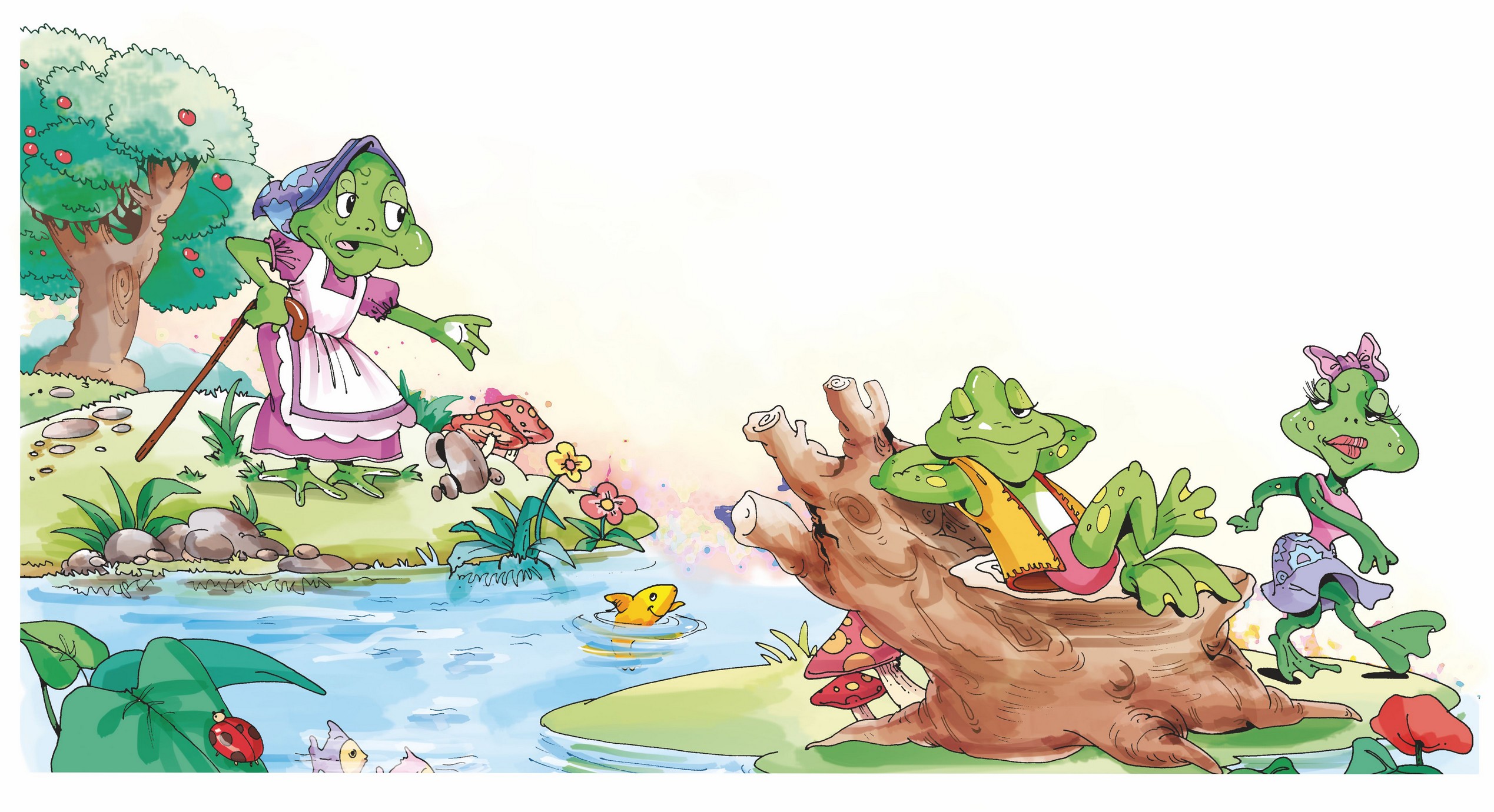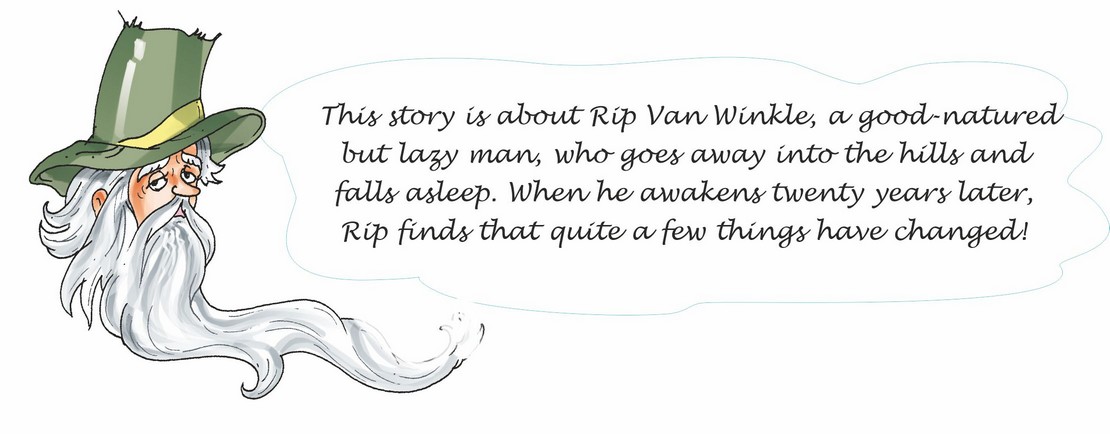Table of Contents

Unit 5: The Lazy Frog
On a school day, you are busy studying, playing and chatting with friends. When you have a holiday from school what do you do? Would you behave a little like the frog in the following poem?

Fred is a very lazy frog
Who lolls all day upon a log.
He always manages to shirk
Doing a single stroke of work.
His poor old mother calls in vain
“Come in and help!” he does not bother
To move two inches, much preferring
To be extremely hard-of-hearing.
He lies there in a silent heap,
And stays conveniently asleep.
If a lady frog hops past
You’d think he would get up at last
To bow, and help her on her way?
But no, I am ashamed to say
That when a lady frog comes by
He does not open up one eye!
ANONYMOUS
New Words
loll : to lie around lazily
log : trunk of a tree that has been cut
shirk : to not do something you should do
in vain : uselessly
prefer : like something better
hard of hearing : deaf
bow : to bend your head to show respect
Let’s Read
1. What did the frog do all day?
2. Besides lazy, what other word can you think of to describe the frog?
(Hint: how he behaved with his mother…,when a lady frog walked by…)
3. Complete the sentences with reference to the poem.
(i) When the frog’s mother called him, he pretended to
(ii) When a lady frog hops by, he does not even
4. Did you like the frog’s behaviour?
Let’s Write
Refer to the poem and understand.
The frog loved to laze and lie around all day.
He did not like to do any work at all.
Now make true sentences about yourself!
Write about the people you like, a game you play, a hobby, a habit you have. You may use the following clues.
I love _____
I like _____
I don t mind _____
I don t like _____
I hate _____
Try and find out the same from your family members also.
Say Aloud
Add one more matching word to each pair. One has been done for you.
log | frog | dog |
shirk | work | _____ |
vain | deign | _____ |
preferring | hearing | _____ |
heap | keep | _____ |
past | last | _____ |
way | say | _____ |
What kind of words are they?
Rip Van Winkle

This story is about Rip Van Winkle, a good-natured but lazy man, who goes away into the hills and falls asleep. When he awakens twenty years later, Rip finds that quite a few things have changed!
Many years ago, at the foothills of the Kaatskill (Kat-skill) mountains, was a little village. In the village lived a simple, good-natured fellow named Rip Van Winkle. He was a kind neighbour, ready to help anyone. Everyone in the village liked him. The children of the village shouted with joy whenever they saw him because he played with them, he taught them to fly kites and shoot marbles, and told them long stories.
The only problem with Rip was that he was very lazy. He did no work on his own farm and just idled away his time. His fences were falling to pieces. His cow was going astray. Weeds grew on his farm. Rip's constant companion was his dog, named Wolf. To avoid work, he would walk away into the forest with his dog.
One day, Rip just walked on and on and reached the highest part of the mountains. It was late in the afternoon when he reached there. Tired after his long climb, he lay down and began daydreaming. It was soon evening and he realised it would be night by the time he reached his village.


Suddenly, he heard a voice calling out, “Rip Van Winkle, Rip Van Winkle!” He looked around and saw a short, old man, with thick hair and a grizzled beard walking towards him with a barrel. He made signs to help him carry the barrel. Rip hurried to help the stranger who caught his hand tightly. Together they reached a place where there were some more odd looking men, playing ninepins. They were all dressed the same way and all of them had beards of various shapes and colours. Even though they were playing a game, their faces

were serious and there was silence! The only sound was the noise of the balls, which echoed in the mountains like thunder.
As Rip and his companion reached them, they stopped playing and stared at Rip with a fixed gaze. Rip was really frightened. His companion emptied the contents of the barrel into glasses and made Rip drink it. Rip obeyed as he was trembling with fear. Since he was thirsty he drank a few more glasses and slowly fell into a deep sleep.
On waking up, he found that he was at the place where he had first met the old man. He rubbed his eyes —it was a bright sunny morning. “Surely, I have not slept
here all night,” thought Rip.
He looked around for Wolf, but he was nowhere. Rip whistled for him. “Wolf! Wolf!” he then shouted. No dog was to be seen. “Where has this dog gone?” he muttered to himself. He began to descend the mountain to go back to his village.


As he neared the village, he met a number of people but he didn’t know any of them. The villagers also stared at him equally surprised. “Who is this man?” said one.
“I’ ve never seen him before,” said another, “look at his long white beard and his wrinkled face.”
On hearing this, Rip stroked his chin and, to his astonishment, he found his chin and, to his astonishment, he found his beard had grown a foot long, and it was all white!
An old woman walked up to him and looked at his face for a moment. Them she exclaimed –“It is Rip Van Winkle! Welcome home again, old neighbour! Where have you been these twenty long years?
(Adapted form The legend of Rip Van Winkle by Washington Irving)

Fun with New Words
1. Circle the correct meaning of the given words. You may need to use the dictionary.
idled away | wasted | rested | admired |
constant | coffee | construct | steady |
companion | dog | stranger | partner |
realise | to understand | to set free | real |
descend | to not send | to be decent | to move down |
barrel | a wooden container | a musical instrument | a bag |
contents | to be happy | the ingredients | the index of a book |
2. Match the words in the box with their meanings. You may take the help of a dictionary.
grizzled, astonished, foothills, stroked, familiar
near the lower part of a mountain _____
with grey hair _____
to rub gently _____
to be very surprised _____
known to you _____
Let’s Read
1. Say whether the following sentences are True of False.
(i). Rip was kind to children._____
(ii). Rip was a hardworking man._____
(iii) The short old man on the mountain was his constant companion. _____
(iv) Rip helped the old man on the mountains because he wanted to have a drink from the barrel. _____
(v) Rip was away for twenty years becaues he was asleep on the mountains._____
(vi) The drink from the barrel made him fall asleep for twenty years._____
(vii) Nobody recognised Rip when he came back because he had reached the wrong village._____
2. Complete the following sentence.
(i) Rip’s village was situated _____.
(ii) The children of the village loved him because _____.
(iii). _____ was his constant companion.
(iv). The villagers stared at him because _____.
(v) The old woman who recognised Rip was _____.
Let’s Write
Work in groups of four.
1. What were the strange things about the men on the mountains?
(i)___________________________________________
(ii)___________________________________________
(iii)___________________________________________
(iv)___________________________________________
2. What kind of a man was Rip Van Winkle?
(i) He was a kind neighbour.
(ii) ___________________________________________
(iii) ___________________________________________
(iv)___________________________________________
Vocabulary Building
1. Pick out the names of the games mentioned in the story.
_______________________________
_______________________________
_______________________________
_______________________________
_______________________________
flying kites chess ninepins shooting marbles mountain-climbing shooting skipping hopping
2. Sometimes we join two words to make a describing word. For example, Rip was a good-natured man, everybody liked him.
Here are some more describing words. Use them to complete the given paragraph.
long-sleeved, high-heeled, well-dressed, open-mouthed, sweet-looking, odd-looking, part-time
Mrs Das has a _____ job in a clothes
shop. Yesterday, an _____ woman walked
Into the shop. She was wearing _____ shoes. A _____ dog was with her. “I want a _____ shirt for my dog; please,” she said. “For your dog?” asked Mrs Das,_____ in surprise. “yes,” replied the woman. “I want him to be _____ for my next party.”
3. Silent letters
What is common in the following groups of words?
(i) knee,knife,knot,know _____
(ii) neighbour, daughter,fight,straight _____
(iii) honest,honour,hour,heir _____
Try and make more silent letter words.
gant :_____,_____
tongue :_____,_____
chalk :_____,_____
whistle :_____,_____
4. Read the two paragraphs given below.
My mother is always awake before anyone else in the family. I usually wake up after 6 o’ clock. I loll around lazily for a few minutes. The I get up and get dressed for school.

At bedtime, I read a story book. When I feel tired I lie down and go to sleep very quickly. I fall asleep in no time at all!
(i) Now find the opposites of the following words from the paragraphs and complete the table.
awake | asleep |
Wake up | _____ |
get up | _____ |
lazily | _____ |
(ii) Fill in the blanks using the words in the previous questions.
(a) _____ and _____ quickly!
You will be late for school.
(b) Shh! The baby is _____. Don't make a sound, or she will _____.
(c) Are you still _____? You should be _____ now or you will not be able to _____ in the morning for school.
Let’s Talk
1. Lots of things must have happened in the village when Rip was away. Imagine you are the neighbour who greets Rip after 20 years. One student should act as Rip. Tell Rip about all that had happened in the village after he left.
(Talk about what happened to his family, to his friends, to the other villagers, to the children he played with, the changes in the village… etc. Your teacher will guide you.)
You may start this way: Guess what happened on the day you left. When you didn't come home in the evening, your wife…
2. Read the speech bubbles. Who walks to school most often?
Put them in order.
Anu: I don’t usually walk to school. I often go by cycle.
John: I never walk to school. I live very far away.
Arjun: I always walk to school. I live right opposite the school.
Mini : I sometimes walk to school, at times I take the bus also
Nazim : I usually walk to school. It's a nice way to start the day.
Creative Writing
1. Write about yourself using the following expressions (do you play in the park, go to bed late, fuss over food, study hard, etc.?)

Always, frequently, usually, often, sometimes, rarely
For example: I always do my work neatly.
(i) _____________________________________
(ii) _____________________________________
(iii) _____________________________________
(iv) _____________________________________
(v) _____________________________________
2. Use the following clues to complete the following exercise.
play, stop, buy, learn, see, meet, learn, be, eat, go, travel, start, read, visit

(i) Write three new things you have done in the last three years.
(a) I have started _________________________________
(b) ____________________________________________
(c) ____________________________________________
(ii) Write three things you have not done in the last three years.
(a) I have not played _______________________________
(b) ____________________________________________
(c) ____________________________________________
Teacher’s Page ______________________________________________ UNIT 5
Poem: The Lazy Frog
Story: Rip Van Winkle
THEMES
Value of time
Social behaviour
Discouraging laziness
Encouraging hard work
READING TIME
The meaning of the difficult words have to be explained alongside. The children should also learn to use the dictionary on their own. Silent reading by the students should be done before attempting the Let’s Read exercises. This will help them to develop the reading skills of skimming and scanning.
CONVERSATION TIME
Each child should get a chance to be Rip’s neighbour. Let them speak sentences that are in the lesson. The children should also be encouraged to imagine what all had happened in the twenty years that Rip was away. However, the teacher should see that they don’t commit factual errors that contradict the main storyline
E.g. all those playing the part of the village children can have English names.
WRITING TIME
Many of the questions are open-ended and could have a variety of responses. This should be encouraged. Some of the exercises in the unit are reflective and allow the child to think about and understand his likes and dislikes.
PROJECT WORK
The meaning of the proverb ‘Time and tide wait for no man’ can make an important contribution to the character-building of the children.
The importance of being on time must also be stressed upon and the children should be asked to cite examples and situations from their own lives.
